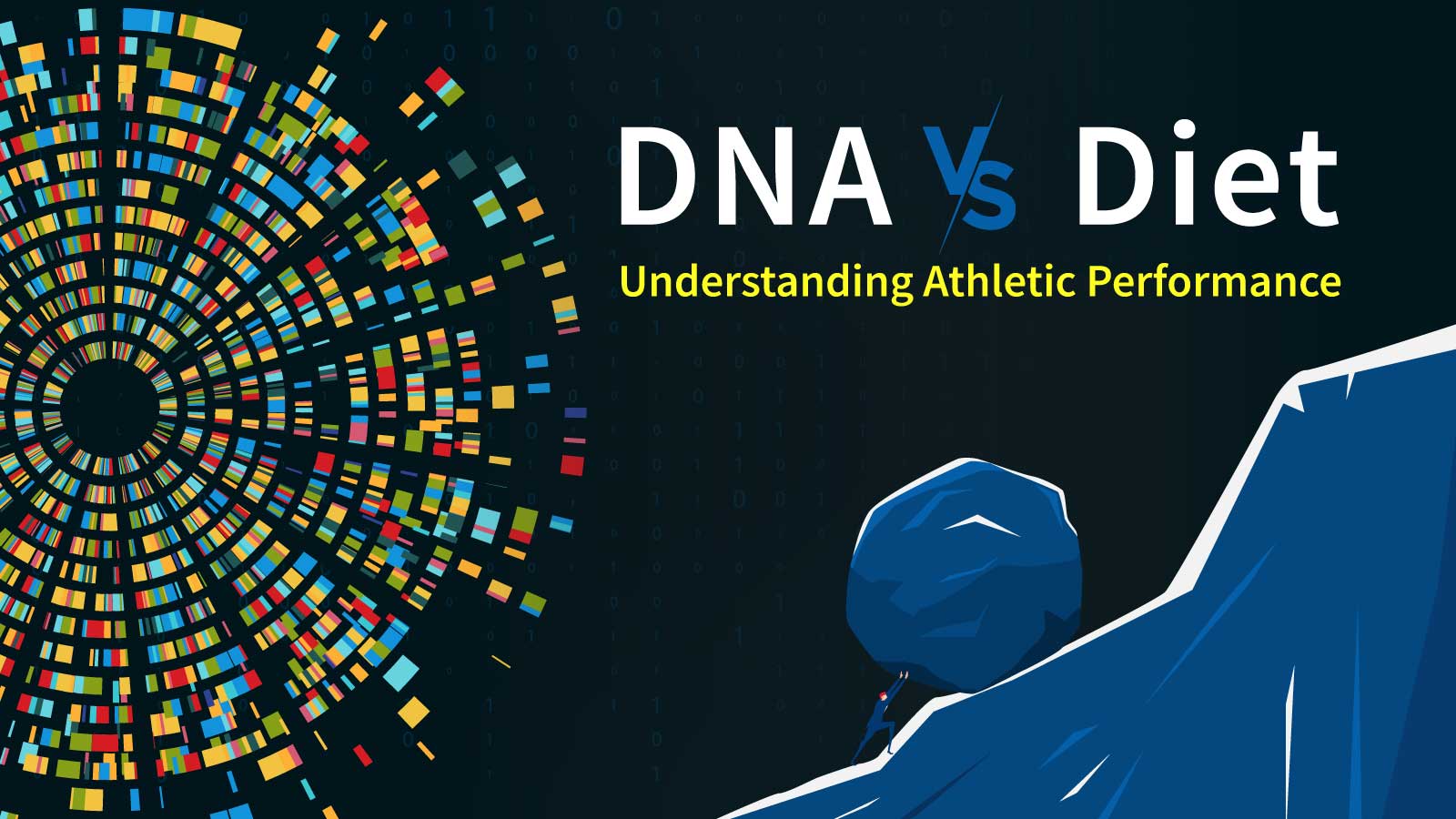DNA or Diet? Understanding Athletic Performance

The good news is that whether you believe your limits are synonymous with your genetic potential or not, there is always room to improve.
In athletic performance, proceed with caution when your support system begins referencing your "genetic potential," a common scapegoat for outcomes or lack thereof when creativity is lacking.
There are always other glaringly obvious variables pointing to opportunities for performance elevation. Truth be told, if you are at the top of a competitive pyramid, only you will know how the climb was made and whether there is more performance on the table than already on display.
In this article, we'll assume a goal of one of the following -
- Increase lean muscles mass
- Decrease undesirable body fat
- Improve or maintain body composition
We'll limit the scope to focus on breaking down barriers to achieving step changes in athletic performance in these two areas -
- The environment of your control (i.e., diet, exercise, stress, sleep)
- Your body's genetic response
Note: This article speaks to athletic performance, not aesthetic performance, with the clear distinction of what the body can do functionally rather than what the body can look like (i.e., the hammer throw, versus Mr. Olympia).
The 10,000 hours rule, hard work pays off, no pain, no gain…that’s what we think most elite athletes put up on their walls for motivation. That’s the drive we believe separates elite athletes from the rest.
While this might be what the eye sees, what drives athletic performance is much more than idioms on the wall.
Am I Limited by My Genetics?
Yes, everyone is limited to some degree by their genetic inheritance; although there isn't a human on earth who has come close to reaching this limit, there is nothing more common than an underperformer with talents beyond their beliefs.
Today's science (the assumption that science continuously evolves) tells us that two main factors determine an individual's athletic performance: genetics and environment.
Studies have shown that individuals are born with a pre-defined window of potential for performance, also known as innate ability.
Think about one's innate ability as a performance efficiency measure applied to any of the abovementioned goals. Think of hard work as an "INPUT"; hard work can be anything, including -
- diet & exercise
- sleep & stress management
- miles run
- weight lifted
- time under tension
Think of your innate ability as a system to which the input, if applied, results in tangible performance.
Although there will always be a direct relationship between your inherited innate talent and your advantage toolbox in attacking a successful life, research has established that "Genetics x ENVIRONMENT" interaction is the true catalyst for achieving maximum performance.
Environment refers to everything within one's control, including training, stress, recovery, and most impactful, nutrition. Individuals with innate ability but not enough dedication to controlling and using their environment will not establish athletic excellence, but this is not the same for individuals dedicated to optimizing their environment with a low innate ceiling given genetics, like a tall gymnast.
With competition in all areas of fitness weeding out the non genetically talented on day one, the days of showing up based on work ethic alone are just about over. Likewise, a dependence solely on your innate God-given ability won't offer you much leverage in a competition where genetic talent is the entrance fee.
The great news is that if you are reading through these thoughts; there is only one logical place to apply effort and achieve a desired performance impact; any efforts made to enhance your genetic make up require a time machine so this becomes straight forward and in a hurry. Although its not practical to update your genetics, understanding your genetic gifts and leaning into them to create advantage is very possible.
How to Leverage Genetics through Nutrition?
We have discussed the importance of creating the "environment" for performance to be achieved. The specific inputs you have access to are items within these spaces -
Training Regiment & Volume - Are you training smart, staying injury free?
Intensity & Mindset - Do you have specific intentions?
Commitment to Sleep Quality - Have you been tested for sleep apnea?
Stress Management - Are you burning the candle at both ends?
If you are like many, losing sleep, carrying high amounts of stress trying to dial in the inputs mentioned above, it's time to get help. Many life coaches, health coaches, performance coaches, and leadership coaches can rapidly help you find that nugget of truth you are missing to dial in the last bit of your performance system.
Consider performance efficiency as how your work ethic within your environmental control directly translates into tangible performance measures. In short, are your genetics responding to your blood, sweat, and tears? How effective is this relationship?
Are you the type that looks at a squat rack and puts 3 lbs. of lean meat on your lower body instantly? Are you what the west labels a hard-gainer (Somatotype).
Learn More: Somatotypes Explained
New publications continue to enter the 2022 limelight emphasizing the value of personalized diets by skilled dieticians. If the focus of your performance improvement is now your protein and nutrition intake, you would be remiss not to incorporate as much personal response data as you have about your body into this mix.
The champions today, no matter the arena, are not determined by large margins but rather the width of the human hair. The difference, albeit small in terms of the day-to-day, is equivalent to performing or not and is all about the selection of fuel we choose to burn.
The focus on this concept gave birth to nutrigenomics: the science of nutrition and genetic interaction.
Regarding the overwhelmingly searched topics of muscle growth and hypertrophy, there is no shortage of recipes and marketed nutritional supplement advertisements claiming to be the panacea.
While we wholeheartedly support well-sourced dairy proteins and creatine, the vast majority offer perceived health for a premium. Understanding what affects the muscle growth rate is essential; ironically enough, it goes back to the "genetics x environment" interaction phenomenon.
While muscle growth is affected by your nutrition, it also goes back to how your genetic code leads your body to respond to amounts and types of food. This concept is probably the best place to use the phrase, "Not all foods are created equal when it comes to how YOU use them, or how your body uses them."
Tying this concept to a practical topic around whey, "bioactivity," is nutrigenomics in action. Where some digestive tracts can accept poor quality food and output performance to hang with the best of them, with the rise of gut issues and food allergens year over year, the latest statistics support garbage-in quality-out as the exception, not the rule.
Learn More: What is Bioavailability?
Learn More: What is Undenatured Whey Protein?
More examples of everyday nutrigenomics include the rate of absorption and utilization of the leucine amino acid (which has a major role in muscle synthesis).
Learn More: Grass-Fed Whey BCAAs
Genetics or Diet for Improving Athletic Performance?
We can clearly speak to the vast links between genetics and nutrition when it comes to human performance outcomes. We can also clearly show that neither genetics or diet alone serve as a panacea to improving athletic performance.
Although its mentally appeasing to hyper focus on independent single factors believed to be the achievement bottleneck. What the research does definitively illustrate is the unimportance of interpreting single factors outside of the systems within systems packed with environmental and genetic component's for answers. and could be the sole limiting factor when it comes to athletic performance in general or muscle development specifically.

